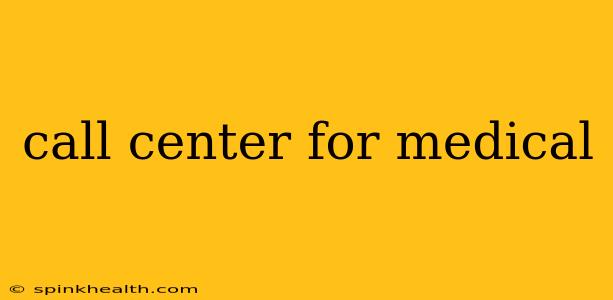The hum of a busy call center might not be the first thing that springs to mind when you picture the healthcare industry. Yet, behind the scenes, medical call centers play a vital role, connecting patients with the care they need, streamlining administrative tasks, and improving overall healthcare efficiency. This isn't just about answering phones; it's about navigating a complex landscape of regulations, patient needs, and technological advancements. Let's delve into the world of medical call centers, exploring their functions, challenges, and the future of this critical sector.
What are Medical Call Centers?
Imagine a central hub connecting patients to a vast network of healthcare providers. That's essentially what a medical call center does. These centers handle a wide range of calls, from scheduling appointments and answering billing inquiries to providing urgent medical advice and facilitating telehealth consultations. They are the vital communication link between patients and healthcare organizations, often the first point of contact for many individuals seeking medical assistance. The quality of service provided by these centers directly impacts patient satisfaction and overall healthcare outcomes.
What Services Do Medical Call Centers Offer?
The services offered by medical call centers are remarkably diverse and cater to the multifaceted needs of both patients and healthcare providers. Here are some key functions:
Appointment Scheduling and Management: Medical call centers streamline the often-complex process of scheduling appointments, reducing wait times and ensuring patients are seen promptly by the appropriate healthcare professionals. This efficiency improves patient satisfaction and minimizes administrative burdens on healthcare facilities.
Billing and Insurance Inquiries: Navigating the intricacies of medical billing can be daunting. Dedicated call center agents assist patients with understanding their bills, processing insurance claims, and resolving payment issues, providing much-needed clarity and support.
Patient Support and Education: Beyond administrative tasks, many medical call centers provide patient support and education. Trained agents answer questions about medications, procedures, and general health concerns, empowering patients to actively manage their healthcare.
Telehealth Support: The rise of telehealth has significantly impacted the role of medical call centers. These centers often facilitate virtual appointments, providing technical assistance and ensuring smooth communication between patients and remote healthcare providers.
How Do Medical Call Centers Improve Healthcare Efficiency?
Medical call centers significantly enhance efficiency within the healthcare system in several ways:
- Reduced Wait Times: Efficient appointment scheduling minimizes patient wait times, improving access to timely care.
- Streamlined Communication: Centralized communication channels improve coordination between patients and healthcare providers, reducing confusion and delays.
- Improved Patient Satisfaction: Prompt, accurate, and empathetic service enhances patient satisfaction and trust in the healthcare system.
- Reduced Administrative Burden: Automating tasks like appointment scheduling and billing frees up valuable time for healthcare professionals to focus on patient care.
What are the Challenges Faced by Medical Call Centers?
Despite the significant benefits, medical call centers face numerous challenges:
Maintaining HIPAA Compliance: Handling sensitive patient information requires strict adherence to HIPAA regulations to protect patient privacy and confidentiality. This necessitates robust security measures and thorough training for all call center staff.
Managing High Call Volumes: Fluctuations in call volume, particularly during peak hours or during public health emergencies, can strain resources and impact service levels. Effective call routing and staffing strategies are crucial to manage these peaks.
Ensuring Agent Training and Competency: Call center agents require extensive training to handle diverse medical inquiries, navigate complex healthcare systems, and maintain professional communication skills.
Integrating with Electronic Health Records (EHRs): Seamless integration with EHRs is essential for accessing patient information quickly and accurately, improving efficiency and reducing errors.
What is the Future of Medical Call Centers?
The future of medical call centers is likely to be shaped by several key trends:
- Increased Use of Artificial Intelligence (AI): AI-powered chatbots and virtual assistants are increasingly being used to handle routine inquiries, freeing up human agents to focus on more complex issues.
- Enhanced Integration with Telehealth: The integration of telehealth into call center operations will likely continue to grow, offering patients increased access to remote healthcare services.
- Data Analytics and Predictive Modeling: Data analytics can be used to identify trends, predict future needs, and optimize resource allocation, leading to improved efficiency and patient care.
In conclusion, medical call centers are essential components of the modern healthcare landscape. They represent a critical link between patients and providers, driving efficiency, improving access to care, and contributing to better health outcomes. As technology continues to evolve, medical call centers will continue to adapt and play an increasingly important role in the future of healthcare.

